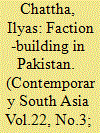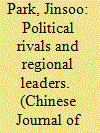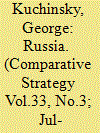| Srl | Item |
| 1 |
ID:
133096


|
|
|
|
|
| Publication |
2014.
|
| Summary/Abstract |
This essay provides new evidence on local Pakistani politics in the immediate post-independence period. It reveals that far from being a period of national unity and service to the fledgling state, the country was mired in faction-building strategies between political rivals, competing for power and scrambling for resources, with debilitating consequences for democratic consolidation. While the new sources - largely based upon the archival records deposited at the National Documentation Centre, Islamabad - provide material relating primarily to Punjab, this essay demonstrates that the tensions between central government and the provinces can only be comprehended by reference to studies of localities.
|
|
|
|
|
|
|
|
|
|
|
|
|
|
|
|
| 2 |
ID:
120152


|
|
|
|
|
| Publication |
2013.
|
| Summary/Abstract |
This article argues that the dual identities of political rivals and regional leaders have been of critical importance in determining China and Japan's regional policies and their bilateral relations within East Asian cooperation. China and Japan, in identifying each other as political rivals rather than cooperative partners, have defined their interests in regional cooperative projects, particularly those led by the other party, in terms of power politics. At the same time, China and Japan's efforts to gain followers' acceptance of their aspired leadership identities have shaped their regional policy options and behaviours. The combination effects of these dual identities have produced variances in China and Japan's regional policies and their bilateral relations within East Asian financial and institutional cooperation. Particularly with regards to regional projects led by the other party and supported by a majority of followers, China and Japan cooperated with the intention of neutralizing the other's dominance in the region and to demonstrate the responsibilities one should assume as aspirant regional leader. China or Japan opposed, in terms of power politics, cooperative projects the other party initiated that did not secure majority support among followers, instead promoting their own initiatives to expand followers' acceptance of their leadership.
|
|
|
|
|
|
|
|
|
|
|
|
|
|
|
|
| 3 |
ID:
133994


|
|
|
|
|
| Publication |
2014.
|
| Summary/Abstract |
Russia's current system of government is weakening. Putin's annexation of Crimea only masks this underlying trend. The system remains centered around Putin. Putin has effectively eliminated individual and institutional political rivals. But public criticism has become more diffuse and hard to neutralize. The impact of public opinion on driving the political process is growing and the opposition is expanding and coalescing. This is manifested through multifaceted forms of dissent and the growing influence of opposition leader Aleksey Navalniy. The dissent, which was initially fueled by prominent opinion makers, evolved into sporadic protests in key urban centers and political campaigns. Why did people who used to support Putin or were apathetic become critical to the point of speaking out and even engaging in opposition activity? The most likely catalyst was the 2008-2009 financial crisis. It undermined Putin's longstanding argument that an authoritarian system, with him at the helm, was necessary for economic advancement. Beyond economics alone, resentment is driven more generally by state incapacity-incapacity to strengthen the social safety net, improve public services, and effectively address corruption; violent crime; natural disasters; and terrorism-which increasingly contrasts Putin's stability narrative. Credible estimates and public perceptions indicate that corruption levels today exceed even those of the turbulent 1990's. Russia's leadership is known to be the key driver and beneficiary of this trend, which is also an important component that fuels discontent. The opposition has not organized into a political party and the government temporarily bolstered its popularity through outside intervention. This makes it hard for the opposition to dislodge Putin and for Putin to contain the opposition, which is creating an impasse. Russia is likely to be increasingly characterized by volatility-internally and on the international stage. This volatility positions the U.S. and the European Union to have greater influence on Russia but it's important for the West to understand how to take advantage of its already substantial leverage.
|
|
|
|
|
|
|
|
|
|
|
|
|
|
|
|